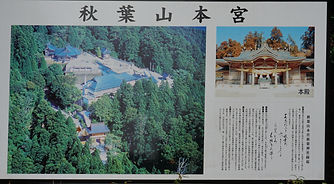普通の外にいくつかの著名な品質を持っている、と畏敬の念を起こさせるあるいかなるビーイングは、カミと呼ばれています。
Shizuoka-ken, Hamamatsu-shi, Tenryū-ku, Haruno-chō, Ryōke 841
静岡県浜松市天竜区春野町領家841 Google Map
23 January, 2021
秋葉山本宮秋葉神社 Akihasan-hongū Akiha Jinja
homepage (Japanese)
Nearest station: Nishi-Kajima, Enshū Line
This is the sixteenth of my ex post facto shrine reports. I visited it in November 2015 along with some friends and was unable to spend as much time there as I would have liked. There are thus too few photos attached to do anything like full justice to this photogenic gem, but the ones there are are quite interesting.
First the name. The “Akihasan-hongū” indicates that it is the main shrine of the Akiba Shrine Grouping. According to Wikipedia there are about 400 Akiba Jinja registered with the Association of Shinto Shrines, while the Kamata table gives a number of 1,600 for the combined Akiba/Atago Grouping (both shrines worship the same kami, Hino-kagu-tsuchi-Ōkami, the god who protects against fire). Wikipedia says there are about 900 Atago jinja, while the Asahi Shinbun puts the number of Akiba at 362. My own database lists 234 Akiba and 702 Atago Jinja.
The shrine is located on Mount Akiha at the southern end of the Akaishi Mountain Range, also known as the Southern Alps. The Lower Shrine, including the shrine office, is at the base of the mountain, while the upper shrine is close to the 866m peak. There are various explanations as to its origin but it is clear that from medieval times it was regarded as a Shintai-san, a mountain which was seen as being a residence of the kami. The shrine legend dates its origin to 709. It is said that when the mountain began to rumble and fires broke out, the then reigning Empress Genmei (元明天皇) indicated that the newly built shrine should be dedicated to the Kami of Fire Prevention, Hino Kagutsuchi no Okami. At that time it may have been known as Kie-no-honkami-no-yashiro (岐陛保神ノ社).
Enshrined Kami:
Main
Hino-kagu-tsuchino-Ōkami 火之迦具土大神
From Merged Shrines
None
In-ground Shrines:
Naigū-sha 内宮社
Gegū-sha 外宮社
Haraedo-sha 祓戸社
Sui Jinja 水神社
Tenjin-sha 天神社
Okuni-sha 小國社
Anzaseki-sha 安座石社
Kaze Jinja 風神社
Yamauba-sha 山姥社
Hakusan-sha 白山社
Yama Jinja 山神社
Annual Festival: December 16

(Click on images to expand them)











The mountain was also sacred to Buddhists and mountain ascetics (修験者) and the shrine shared the ground with a Buddhist temple, Shuyoji (秋葉寺). The latter’s main deity was Kanzeon Bosatsu (観世音菩薩,Kannon-sama).
Another deity worshipped on Mount Akiha, also viewed as a kami of fire prevention, was Akiha Daikongen (秋葉大権現), and this became the name of the shrine in medieval times. In the early Meiji period it was renamed as Akiha Jinja in line with the separation of Shintō and Buddhism and in 1952 it was given its current name in recognition of its position at the apex of the Akiha Jinja grouping.
The shrine is proud of its collection of swords. Hino-Kagu-tsuchi (also known as Hinoyagihaya) was the 35th kami born to Izanami. So difficult was the birth that Izanami’s vagina was badly scorched and she began to die. When she finally did pass away, Izanagi, Hino-Kagu-tsuchi’s father, was so distraught with anger that he beheaded his son using a sword now known as Ame-no-Ohabari. From the blood that poured forth from Hino-Kagu-tsuchi eight kami came into existence: these became known as the Deities of the Sword. According to a document dating from 1890 there were 185 swords in the shrine’s collection at that time. The shrine’s home page shows four of these swords and two of them have been designated as Important Cultural Assets.